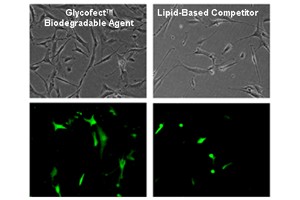
UC-Developed Technology to Assist Research and Genetic Drug Delivery
Techulon, Inc., a life sciences company, has signed worldwide exclusive license agreements with the University of Cincinnati to manufacture and sell novel transfection reagents used for research and therapeutic delivery of nucleic acids. The licenses cover a family of new molecules invented by
while she was a faculty member in the Chemistry Department of the McMicken College of Arts & Sciences and described in two patent applications filed by UC.
The polymeric transfection agents we have licensed from the University of Cincinnati are an exact fit for our business, states Frank Akers, president of Techulon. Our ionic biopolymer expertise and infrastructure allow us to bring products to market almost immediately. Our first product, Glycofect, is especially effective in transfecting DNA into cells because of its low toxicity and efficiently induced transgene expression. These qualities make Glycofect especially suitable for sensitive and difficult-to-transfect cell lines or primary cells.
Marketed under the name of Glycofect Transfection Reagent, the new polymer-based formulations demonstrate unparalleled efficacy for delivering genetic materials into a variety of cell types for health-related research and drug development.
In contrast to currently used lipid-based transfection reagents that dominate a growing $100 million market, Techulons products are based on novel carbohydrate polymer structures invented by Reineke, now an associate professor of chemistry at Virginia Tech.

Glycofect Transfection Reagent, a biodegradable polymer, shows higher cell viability and more protein expression in primary cells than leading lipid-based competitors. Shown above are primary dermal fibroblasts transfected with EGFP-C1 plasmids.
This new class of polymers can deliver DNA research reagents and therapeutics into a high number of cells and tissues types without causing cell damage or death, Reineke says. After cellular delivery, the glycopolymers degrade and release their DNA cargo to perform its biological function without toxic side effects.
We intend to expand our transfection reagent offerings, plus we have sublicenses available for companies needing a highly efficient vector with low toxicity to aid in their drug discovery, says Akers. Techulon has strong developmental and synthetic capabilities headed up by Joshua Bryson, who studied under world-renowned biomaterials researcher Theresa Reineke at the University of Cincinnati. Techulon will work in partnerships to tailor our delivery vehicles for optimal effectiveness of novel genetic tools and drugs.
Bryson, principal scientist at Techulon, adds, The exceptional delivery, high gene expression, and low toxicity of GlycofectTM are particularly evident in primary cells. This is of great benefit to biological and medical research because current transfection reagents do not work well with primary cells and these cell types are very costly and difficult to obtain.
Glycofect has been sampled to a number of medical research laboratories that have identified a broad spectrum of applications. In some cases, Techulon is cooperating with researchers to tailor the Glycofect formulations to optimize results for a variety of applications including siRNA delivery. Glycofect will be available for purchase as a transfection reagent for research applications on April 1, 2010. Techulon also plans to sublicense Glycofect for therapeutic development.
Techulon, Inc., located in the Virginia Tech Corporate Research Center, is a life sciences company that develops novel ionic biopolymers for a variety of biological research and therapeutic applications. Techulon is a privately held Virginia C-corporation founded in 2006, with an experienced management team composed of alumni of the Virginia Tech College of Science.
About the UC Intellectual Property Office
The mission of UC's Intellectual Property Office is to facilitate, advocate and collaborate with faculty, students and staff to support an environment for invention and innovation at the University of Cincinnati by transferring and commercializing university intellectual assets into benefits for our region and the public good.
Related Stories
Creating a stronger community on and off campus
April 23, 2025
UC student leaders discuss the need for better student-neighborhood relations and a desire to build a better community on campus. Student Body President Joshua Copley and Student Body Vice President Wilaini Alicea are being their term with UC Student Government.
UC celebrates Earth Day 2025 with award-winning publication
April 21, 2025
Earth Day celebrates its 25th anniversary this year. Since its inception, Earth Day has gone global, and with its adoption have come federal intuitions such as the EPA (Environmental Protection Agency) and policies familiar to most: the Clean Air, Clean Water and Endangered Species acts. This year, UC’s College of Arts and Sciences has reason to celebrate as well. It’s a regional win, capturing the reformation of Fernald, a former nuclear production facility located in northwest Cincinnati. Professor and environmental historian Casey Huegel has received numerous awards for his book, “Cleaning Up the Bomb Factory: Grassroots Activism and Nuclear Waste in the Midwest,” (Weyerhaeuser Environmental Books, 2024).
UC student receives renowned Truman Scholarship
April 18, 2025
Harshman Sihra, a reproductive health advocate planning a future as an OBGYN and public health policymaker, is now the third University of Cincinnati student to win the Harry S. Truman Scholarship.
